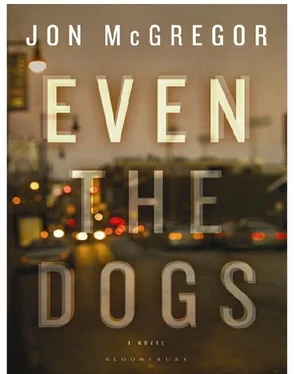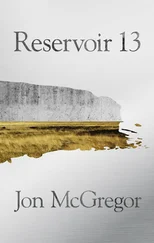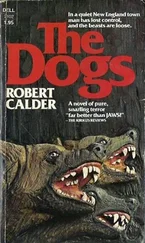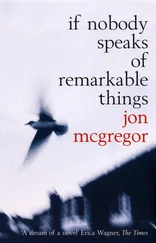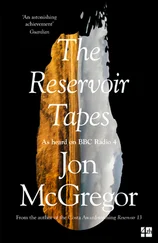Jon McGregor
Even the Dogs
Cut off from hope, we live on in desire.
— Dante Alighieri, The Inferno
They break down the door at the end of December and carry the body away.
The air is cold and vice-like, the sky a scouring steel-eyed blue, the trees bleached bone-white in the frosted light of the sun. We stand in a huddle by the bolted door.
The street looks quiet, from here. Steam billows and sighs from a central-heating flue. A television flickers in a room next door. Someone hammers at a fencing post on the far side of the playing fields behind the flats.
An overflow pipe with a fat lip of melting ice drips on to the walkway from three floors up, the water pooling and freezing in the shade of a low brick wall.
Cars drive past, from time to time, their windows fogged and their engines straining against the cold.
We see someone getting out of a taxi parked further up the hill. She leaves the door open, and we see two carrier bags stuffed full of clothes and books and make-up on the back seat. She comes up the short flight of steps, and bangs on the door. This is Laura. She shouts through the letterbox. She gestures for the taxi-driver to wait, and goes round to the side of the building. We see her climbing on to a garage roof and in through the kitchen window of the flat. She stands in the kitchen for a few moments. She looks like she’s talking to someone. She climbs out again, drops down from the garage roof, and gets back into the taxi.
Later, in the evening of the same day or the day after that, with the other flats glowing yellow and blue from behind thin curtains and pinned-up sheets, we see Mike scrambling up on to the garage roof. We hear shouting, and something being broken. We see Ben, running down the hill towards town.
We see Heather, another morning, hauling herself up the steps and banging on the door, an opened can in one hand. She shouts through the letterbox and looks through the glass. The old woman from the flat next door comes out and says something. They argue, and Heather bangs on the door again before walking off down the hill towards town.
We see Mike, talking on his phone, his long coat flapping around his knees as he strides out into the road.
The streetlamps come on, slowly, glowing red and then orange and then flickering out again as the dawn unfurls. Frost forms across the playing fields and the grass verges, and is smudged by footprints and tyres and the weak light of the distant sun. Time seems to pass.
We see Danny, running across the playing fields with Einstein limping along behind him. We peer round the corner of the flats and see him climbing on to the roof of the garages. Einstein looks up, barking and scrabbling at the garage door, and we hear the creak of a window being opened.
The old man in the wheelchair appears. We know him but we don’t know his name. He’s not even that old but it’s something to call him. He inches along the pavement, gripping the wheels with hands wrapped in rags and unravelling gloves, his face twisting with the effort of each small push. Grunting faintly as he goes. Huh. Hah. Huh. He glances towards us but he doesn’t stop. Huh. Hah. Huh.
The window opens again, and we see Danny jumping from the roof of the garages, falling, landing awkwardly and stumbling when he tries to get up. He picks up his bag and his blankets and he hurries away down the road towards town, passing the old man in the wheelchair and calling Einstein to follow him, his blankets slung over his shoulder and trailing along the ground and he doesn’t look behind him as he goes.
It gets dark, and light, and dark again, and we wonder whether anyone else will come. There are more of us now, and we stand in silence by the door, looking up and down the road.
There’s no siren when the police finally arrive. They drive slowly up the hill, peering out from the window at the numbered street signs. They pull over at the bottom of the steps and sit there for a few moments with the engine running, talking on their radios.
Someone looks out of a window on the second floor and turns away, pulling the curtains closed.
The front door of the next flat along opens slightly.
The two policemen get out of the car, rubbing their gloved hands together, squinting against the cold and the low late-afternoon sun. One of them, a young-looking man with pale blue eyes and a thin nose, goes to the boot and takes out a pair of long torches. They walk carefully up to the flat, avoiding the ice creeping down the steps, and we move away from the door. Their breath clouds around their faces and trails off into the air.
The door of the next flat opens further, and an old woman appears. She watches the two men shine their torches through the glass panels of the front door and shout through the letterbox. She’s wearing a checked dressing gown, and a pair of slippers in the shape of tiger’s paws. She says something to them, folding her arms. The younger policeman turns to her and nods, and when she says something more they ignore her.
A car slows as it passes, stopping for a moment and then driving on.
What took them so long. Where were they.
They test the door with their shoulders, and then the younger policeman steps back and kicks at the lock. The door falls open. They both move forward, and turn away again, covering their noses and mouths. They look at each other, and lift their torches to shine a narrow light into the flat’s dark hall. The old woman shuffles closer, hugging her arms a little tighter around her chest, and we look past her into the torchlit gloom. The place is a mess, but we knew that already. The walls are scribbled-over and stained, bare wires hanging from the rotten plaster. The floor is covered with bottles and cans and blankets and clothes, a pile of car tyres, shards of glass. And there must be a foul smell, the two men’s hands still pressed over their noses and mouths and their faces still half turned away. The younger man coughs, as though something is sticking in the back of his throat. The older man puts a hand to his colleague’s arm, speaking quietly.
They don’t see us, as we crowd and push around them. Of course they don’t. How could they. But we’re used to that. We’ve been used to that for a long time, even before. Before this.
Their boots crunch and snap on the debris-covered floor. They walk slowly, and they let the light of their torches lead the way. They call out, something like Hello, police, hello. They glance at each other, and they move further into the flat.
The younger man, turning right at the end of the hall where his colleague has turned left, finds the body lying on the sitting room floor. He looks for no more than a second or two, his eyes widening, and then he calls out, backing away, clamping his fist over his mouth. The older man comes through from the kitchen, his feet grinding across more broken glass as he steps past into the sitting room and sees what’s there. He flinches slightly, and nods. He shines a torch over the body, the damp clothes, the broken and blistered flesh. He points out something that looks like blood, puddled across the lino, a trail of it leading into the kitchen. The younger man, still standing in the doorway, speaks into his radio, asking for something. They don’t speak. They wait. They look at the body. We all crowd into the room and look at the body. The swollen and softening skin, the sunken gaze, the oily pool of fluids spreading across the floor. The twitch and crawl of newly hatched life, feeding.
It’s Robert. But we knew that already.
The sky is darkening outside, a faint red smudge along the treeline by the river, the clouds stretching low and thin towards the ground.
Читать дальше
Конец ознакомительного отрывка
Купить книгу
